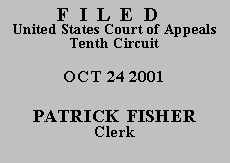

Before the district court, Mr. Ashford filed a "Motion to Entertain Complaint," explaining why his exhaustion of the Bureau of Prisons' administrative grievance procedure had been rendered impossible. The district court, relying on Garrett v. Hawk, 127 F.3d 1263, 1267 (10th Cir. 1997), ruled that the motion was unnecessary because the complaint sought only money damages, which are unavailable through the prison grievance procedures. Garrett has since been disapproved by the Supreme Court, which held that exhaustion is required, regardless of the relief offered by the administrative procedures. Booth v. Churner, 121 S. Ct. 1819, 1825 (2001). Before reaching the merits, it must be determined whether Mr. Ashford has satisfied the exhaustion requirements.
Accordingly, the district court's judgment is VACATED and this case is REMANDED for further proceedings not inconsistent with this order. Mr. Ashford's motion to appeal in forma pauperis is GRANTED.
ENTERED FOR THE COURT
David M. Ebel
Circuit Judge
*.After examining appellant's brief and the appellate record, this panel has determined unanimously that oral argument would not materially assist the determination of this appeal. See Fed. R. App. P. 34(a)(2) and 10th Cir. R. 34.1(G). The case is therefore ordered submitted without oral argument. This Order and Judgment is not binding precedent, except under the doctrines of law of the case, res judicata, and collateral estoppel. The court generally disfavors the citation of orders and judgments; nevertheless, an order and judgment may be cited under the terms and conditions of 10th Cir. R. 36.3.